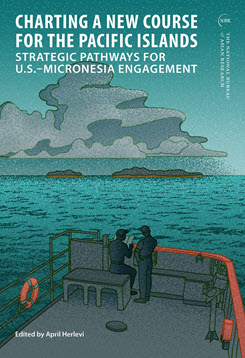Essay from NBR Special Report no. 104
The Twin Transnational Threats of Climate Change and Covid-19 in Micronesia
This essay examines the relationship between the twin transnational threats of climate change and Covid-19 in the Micronesian subregion and the consequent impact on healthcare.
EXECUTIVE SUMMARY
MAIN ARGUMENT
The low-lying countries of the Micronesian subregion, such as Kiribati, the Marshall Islands, Micronesia, Nauru, and Palau, are profoundly vulnerable to climate change. The eruption of Covid-19 placed further pressure on these heavily aid-dependent countries. The combined impacts of these threats will amplify these countries’ vulnerability and test their adaptability. In particular, the health sector will be buffeted by both acute and chronic challenges. Not only will climate change and Covid-19 have first-order effects, but their second-order effects may also erode social cohesion, increasing the negative impacts of social conflict.
POLICY IMPLICATIONS
- Micronesian governments must continue their work on both healthcare and climate adaptation. This should include protecting or relocating critical healthcare infrastructure, such as hospitals, to protect against storm surges and flooding.
- Donor governments may want to deepen engagement in projects that have dual climate and health benefits, such as including a climate-related narrative in all health monitoring data collection.
- Strengthening both first-order replies in the health sector and second-order social resilience will be a necessary step in years to come.
Alan Tidwell is the Director of the Center for Australian, New Zealand, and Pacific Studies at Georgetown University.


